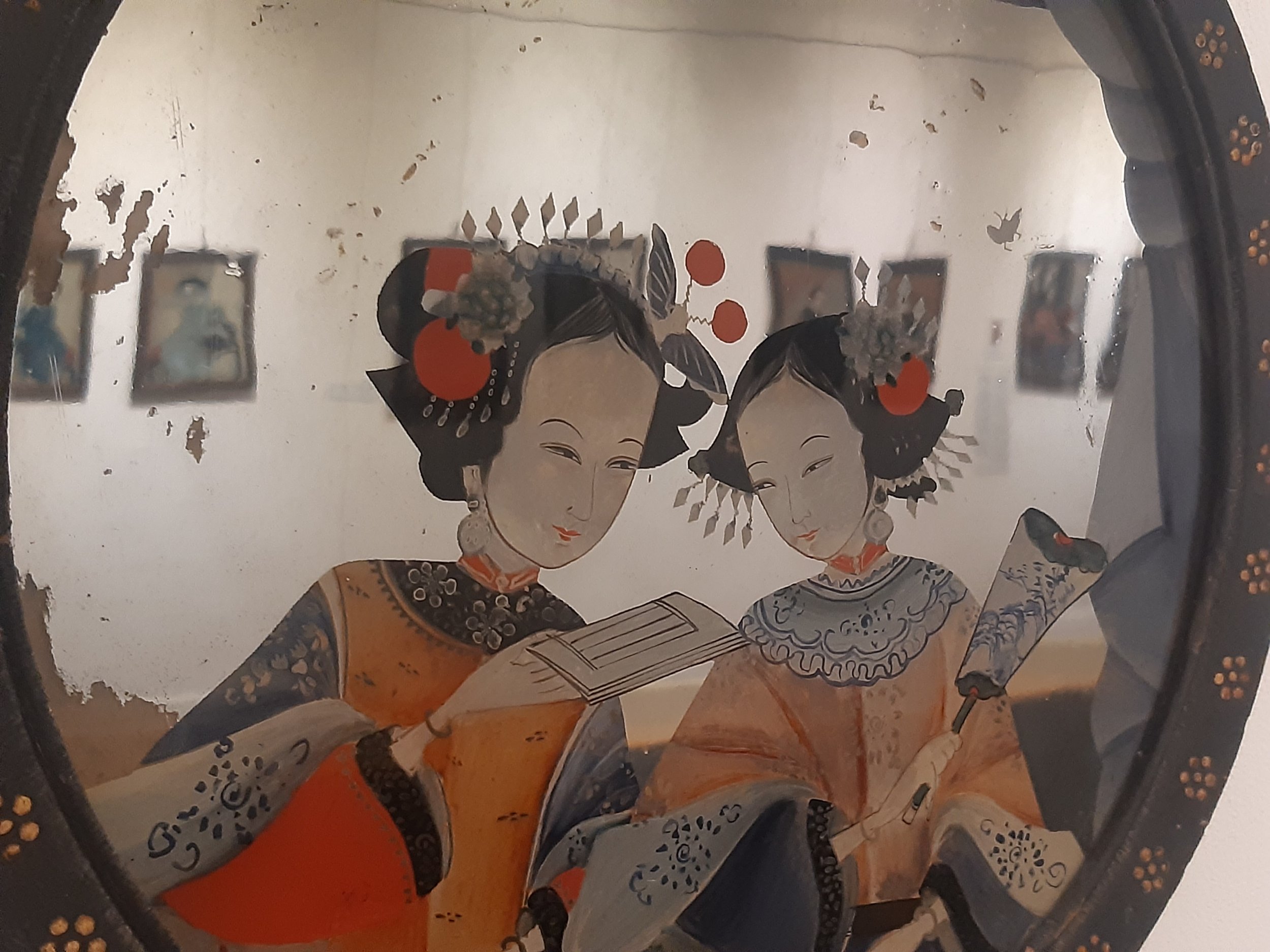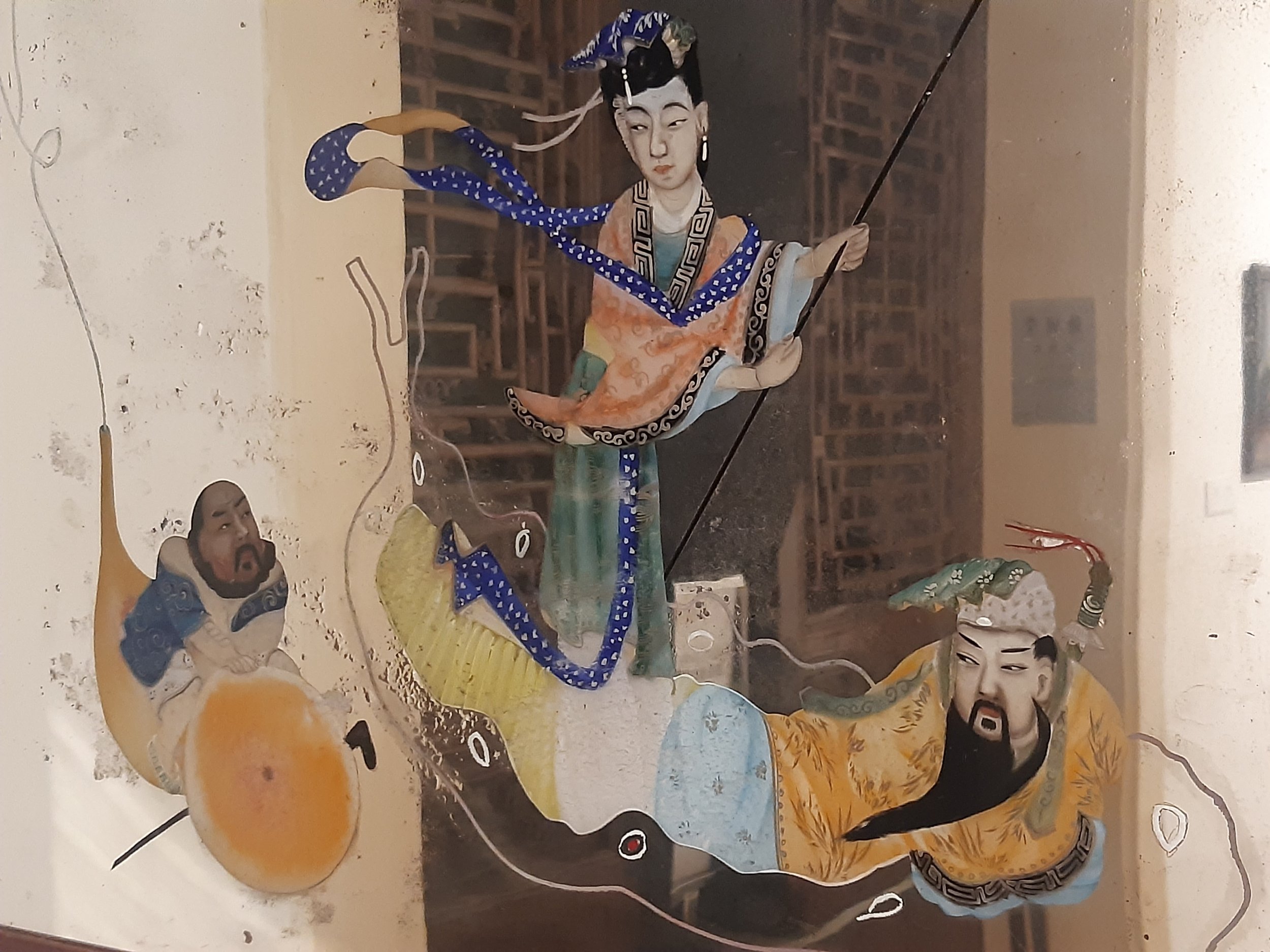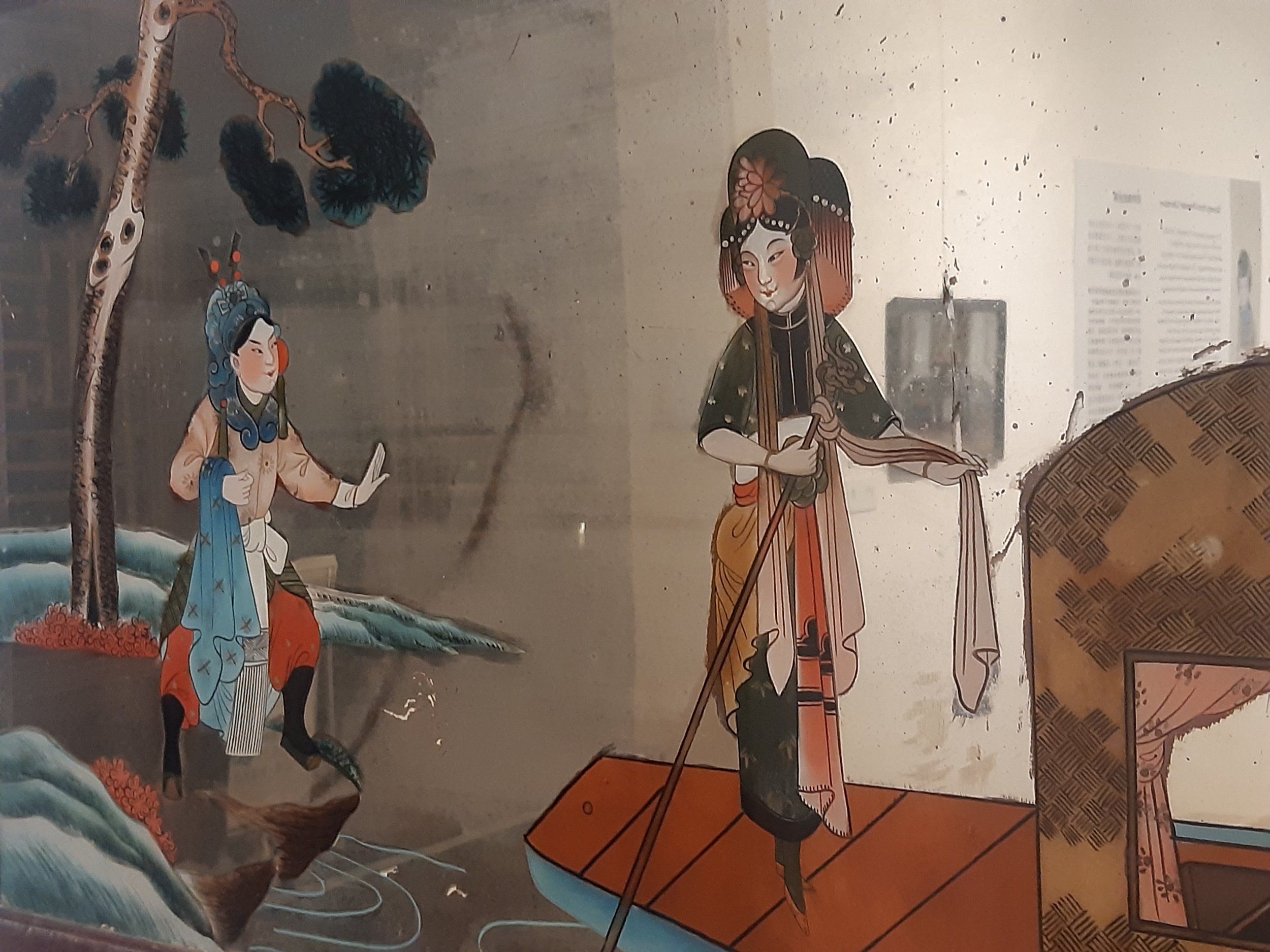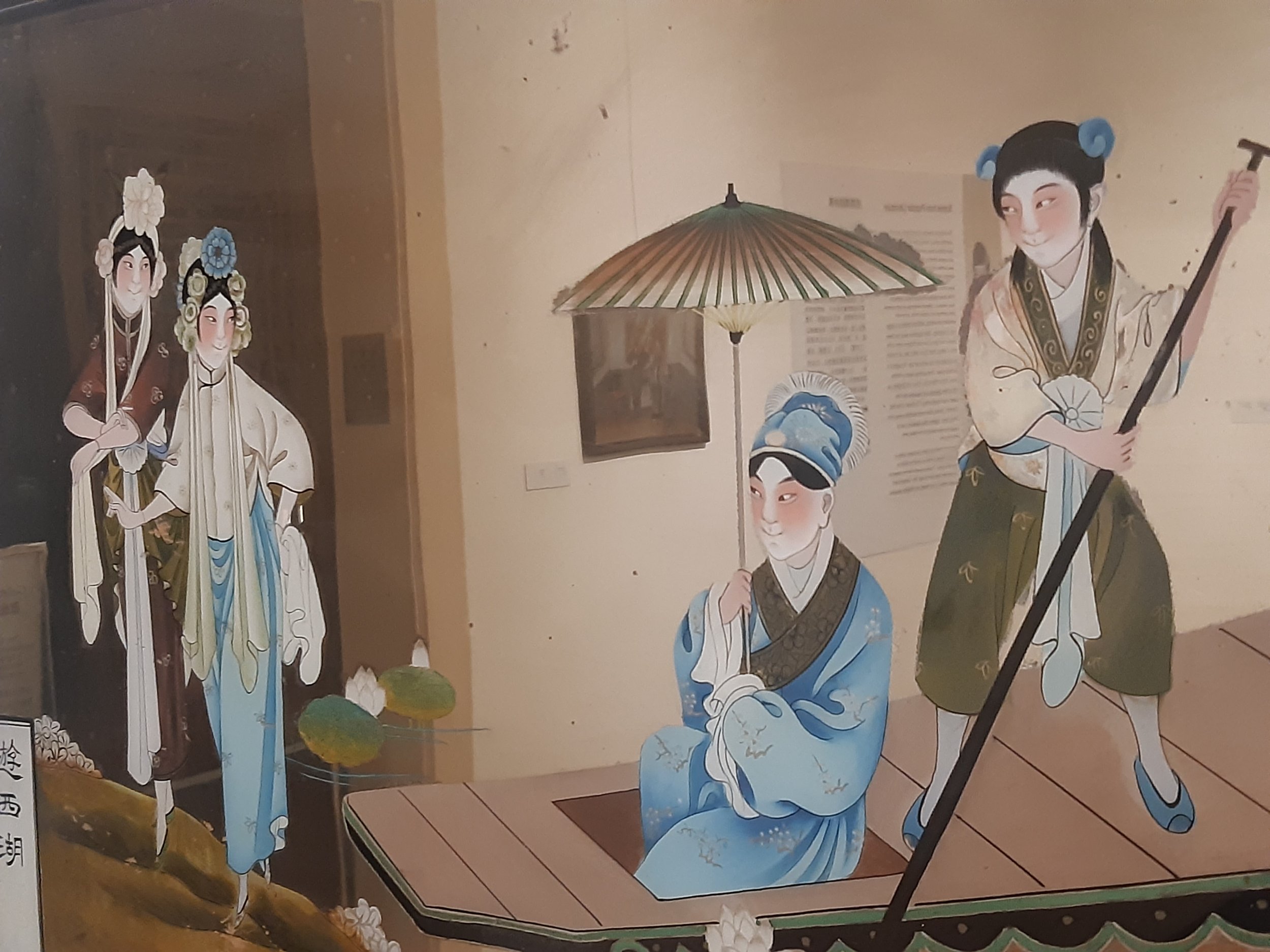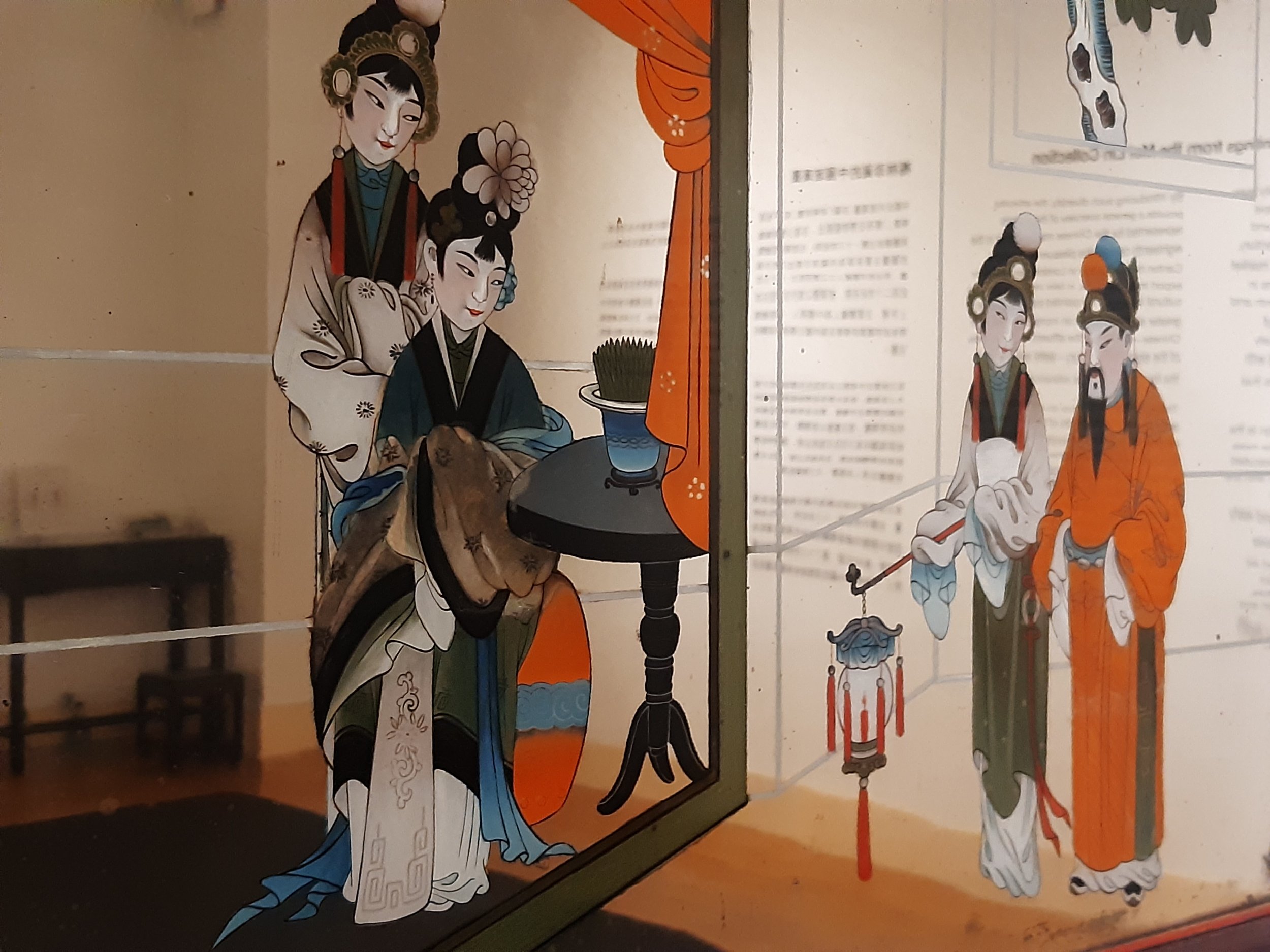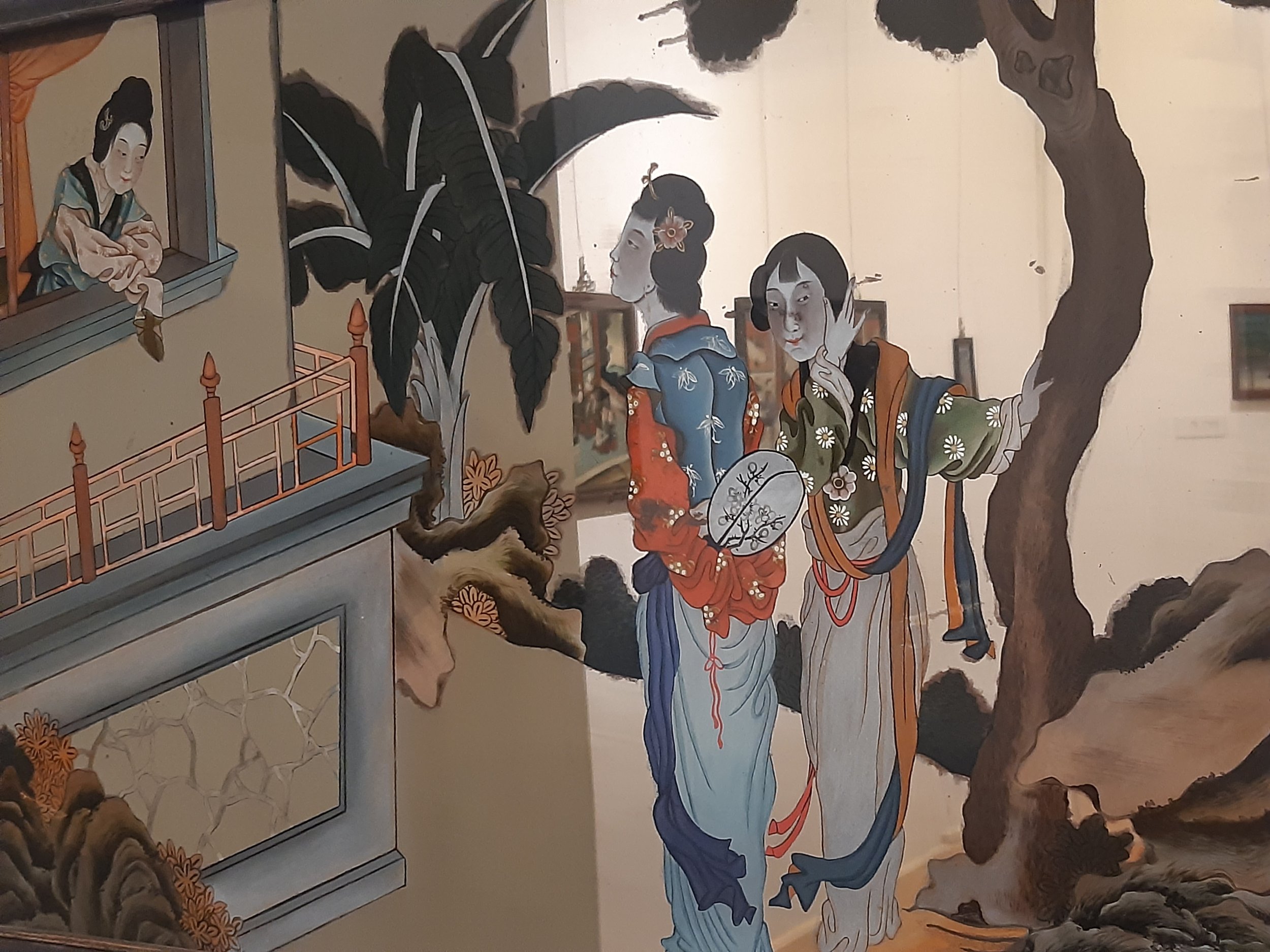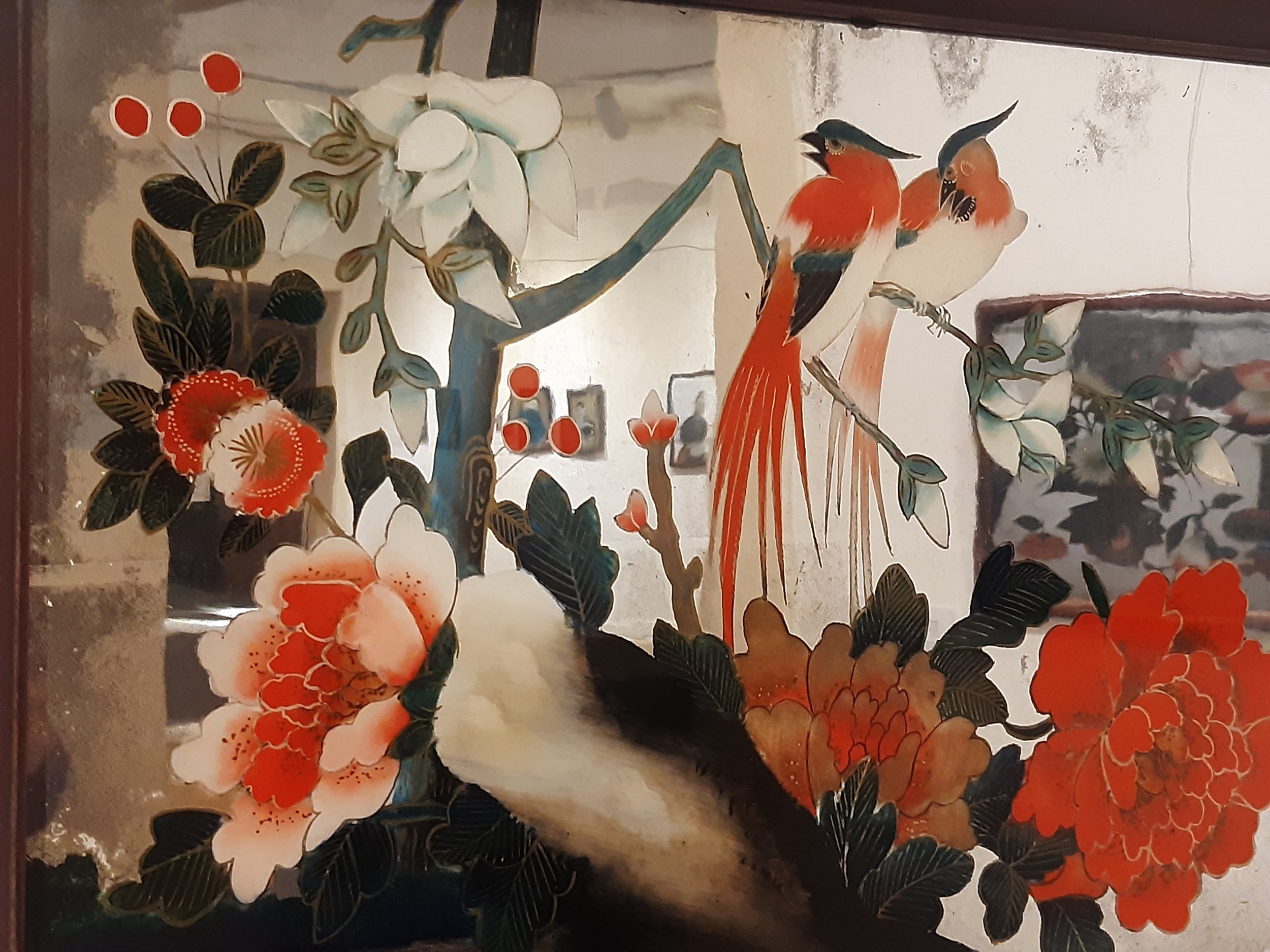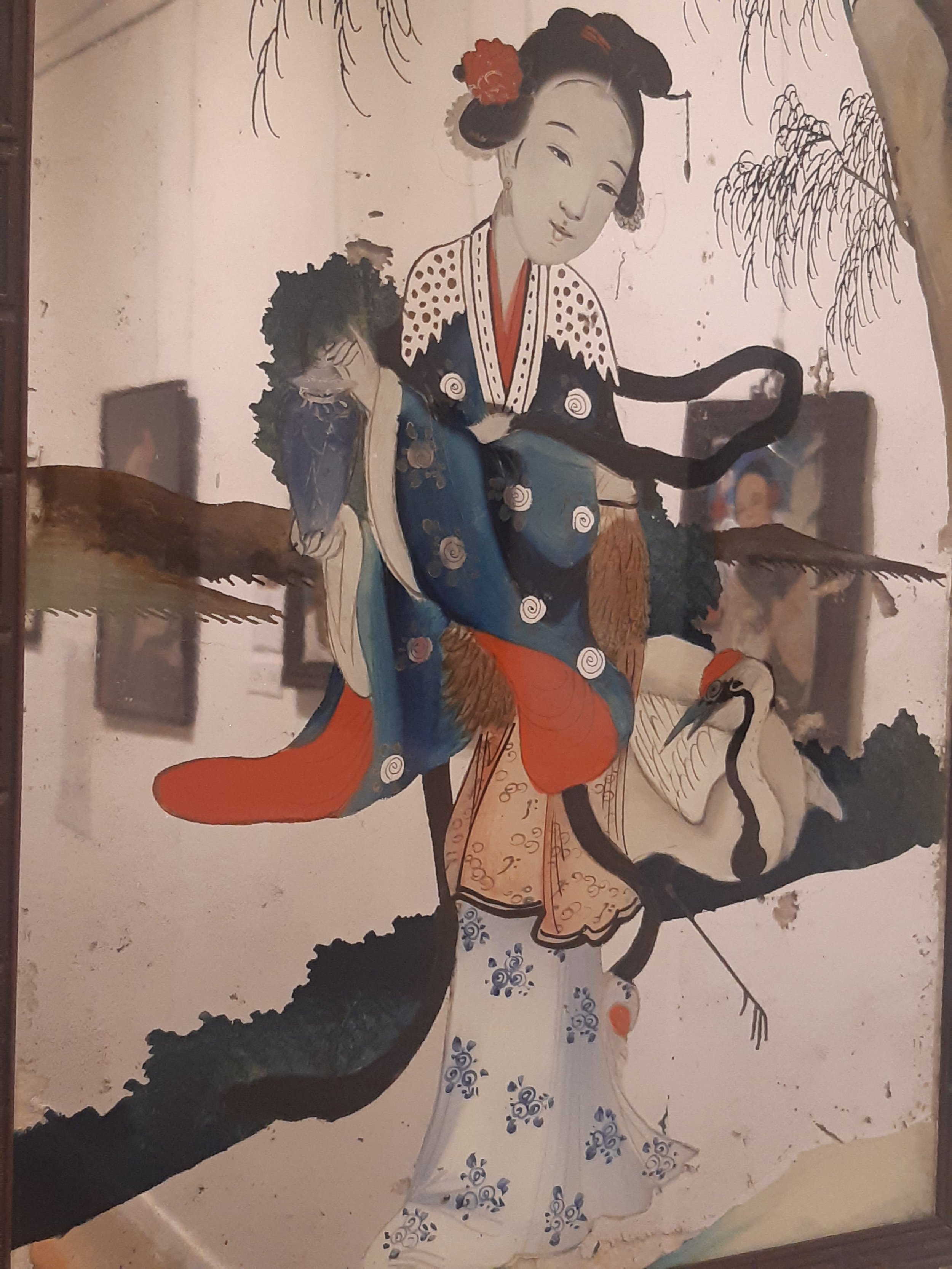It is always a nice and special perspective to approach a countryside or city by boat. It is a detached world from the buzz. Living on a boat, is even a step beyond, specially in the Netherlands. And then there is the second Dutch mode of transport: the bicycle. As my Marina is close to Arnhem, I explored the ride on my folding bike to the city. One objective is also to take the bike to the train station and then fold it up and take the train to Tilburg University. This sounds like a nice commute. The best mode of commuting, I ever had was taking ice skates in winter from my home to the office in Beijing. But also, now boat-bike and train sound like a good option.
Where are all the Superyachts gone?
From Moscow with Love
Escalation, war and black humour
Like I was taken by surprise by the falling of The Wall on November 9th in 1989, I am now shocked how fast the curtain is dropping again. I understand the logic and sequence of events, as much as you can follow it in times when war propaganda, Poker and Brinkmanship games have taken over. Now is the 27th of February 2022, a European country is “specially operated to be demilitarised”, and the world is held at gunpoint. All this escalated in less than a fortnight. Yes, the Minsk agreement has not been implemented and war in Eastern Ukraine has been watched (and ignored) by the world for 8 years. Yes, a potential NATO expansion into Ukraine makes it far more of a hiding place for short and medium-range rockets than the Baltics. Yes, American diplomacy can be alien and can be perceived as arrogant. Yes, the main Russian concerns have been ignored in the last minute diplomacy before the “special military operation” in Ukraine. But this shall serve as an explanation for what? For invading a sovereign state? For throwing back the world more than three decades in history? Or even 60 years into a Cuban Missile Crisis scenario? Or even dropping it into the end of history, with new weapon categories? Yes, as in the old Sting piece, “the Russians love their children too”. Meanwhile, in Ukraine, civilians are getting armed. With all respect to the individuals engaging in this, but especially in an urban warfare scenario, this is just a strategy to get more people slaughtered on all sides. Distributing 25 000 AK47 (Kalashnikov) to everybody who claims to defend Ukraine? I would consider it quite dangerous. How does this actually work? I mean, if I need an AK 47 next time to rob a bank, I know where to get it. And now, among others, German-made bazookas (Panzerfaust) and Stinger SAMs are added to that. Isn’t that a little dangerous? I am just asking. Isn’t this arming a partisan war? If yes, is this not a mistake that has been done before multiple times?
President Lukashenko of Belarus is now inviting for peace talks or at least ceasefire negotiations in a location close to Chernobyl. This sounds like a setting for a James Bond movie. I do wish him and the delegations all the best of success for all of us, and especially for people now suffering in Ukraine. And I do hope nobody has a nervous trigger finger. I even feel in the old times, there may have been more communication channels to avoid tactical misunderstanding. Instead, channels are deliberately shut. This worries me.
For Russia falling back on China as a strategic partner: is “system Putin” really so sure, that China will throw an economic lifeline to come to the rescue? Even not talking about the level of Central Government, if I remember correctly from my 12 years of living and working in China, financial institutions will watch their diminishing ROI in Russian investments carefully, and turn their back on it when necessary. And then, what about the long common border between China and Russia’s East? Crossing the Amur/黑龙江 Hēilóng Jiāng river, there are large numbers of Chinese migrating into Russia, which develops the area economically, but also brings risks of community imbalances. I have been there and seen it on the ground. And what happens to the “New Chinese Silk Road”, when a new Iron Curtain comes down? And the Russian elites themselves, being stuck, having assets frozen, having their companies blacklisted? They will not be happy. The Russian middle class, whose savings diminished, will soon have to decide between a holiday in Turkey or a new winter jacket? The same ones who are dreaming of a better life for their kids in a free society. Will they think, this is worth it? And the Russians who get desperate Telegram messages from friends and family in Kyiv and Odesa? Or those who receive the letter, that their son died for a “greater good”? The list can go on and everybody is just losing. Potentially even the people of Eastern Ukraine.
On the other hand, I have to apologize if I missed that Ukraine recently became a shining lighthouse of democracy and human rights. My personal impression was that it would be still a long way, just to handle corruption (somewhere in the category “worse than Romania”). I also encountered Ukrainian professional rioters in Hong Kong in 2019, just flown in to train and brutalize protestors. They used as a personal credential that they were there at the Maidan square in 2014. They were just dangerous assholes, armed with Gerber LMFIIs. But there is another thing, which I failed to realize about Ukraine: Nazis. Sure, there must be some. We have them in Germany too, unfortunately. But most Ukrainians, I know are lovely, friendly and peace-loving people. Like the Russians.
In the end, I guess, we have been all lied to and now just propaganda rages on all sides. Just one, for a change, did very accurate predictions: the US intelligence agencies. Not that I would be a fan, but they were giving fairly accurate predictions, of what is about to happen. New leadership? There is a lot of black humour emerging. I like black humour. But it stops being funny when it meets the current realities.
Hole in the sky
The last time I have experienced such a massive closure of airspace for civilians was in the days after September 11th 2001. Two days later, I flew to Buenos Aires and it started with an evacuation of Hannover Airport triggered by a bomb threat. Finally, we arrived well in Argentina, where the country was in a severe economic depression and surging inflation driven by the pegging of the Argentinian Peso to the USD. Later, in December that year, Argentina busted into riots, and Argentina declared state bankruptcy. In all of this, we had a car factory, with ambitious targets of the newly appointed company president for Argentina, Viktor Klima. Viktor gained experience as a politician before, being the Chancellor of Austria from 1997 to 2000. It took me a while back then, to understand that actually, a former politician can achieve more in this environment than a bunch of restructuring managers.
Back then, there were no cool internet tools to map the airspace, so I literally drew up my maps on the back of an envelope, continuing travel to Brasil, Mexico and finally the US.
Today, it’s a few clicks on the web browser to see a huge hole in the sky over Ukraine and parts of South-West Russia. Personally, I was surprised to wake up to the news, that Russia actually did launch a “special operation” last night, claiming to take out Ukrainian military infrastructure. Russian friends told me, that this clearing of the airspace and rerouting of civil flights started visibly at one in the morning and this hole took shape at around 3 a.m. This morning at shorty after 9:00 Russian media reported that the Ukrainian air defence is largely destroyed. Who knows, what’s true. But given that airspace interference started visibly to the public, just after midnight, I can’t quite understand why Western Media acted so surprised in the morning. Not paying attention? Making a drama? Well, it’s dramatic enough, if you ask me.
Source: www.planefinder.net (accessed on 24.02.2022 at 12:50 GMT+1)
Chainsaws and the way they change how people listen
As expected, two storms in a row, also left a bit of damage in the forest. So yesterday, I took my dog and a chain saw to sort out a few things. Following the trend of electrification, recently I ditched the petrol engine chain saw against a battery-powered model with the Bosch 18 V system. I found it so practical, that I carried it with me also while shopping and for paying at the fuel station. It did not go unnoticed while doing so, that people treated me more respectful and listened very carefully, not just to what I asked, but also to how I said it. And also they smiled more and set their words more carefully. Of course, I know that different dress codes can change the conversation. In Asia, for example, you are treated more respectful when you wear an expensive watch. But, trust me, just wearing my Casio watch and a chain saw completely changes social interaction. I am thinking of taking one into the next management meeting. I am sure, this would have a very positive effect on the way decisions are made. I am obviously not a career coach, but I can see the potential of a whole new category of “dress for success” advice.
By the way, no tree fell in the storm. They are mainly oaks and the storm just took out a few branches, which would have fallen anyway soon. Still, it is a good reminder, not to go into a forest during a storm, but they were cut to handy firewood in no time. Also, it is now time to start planting for the new year. I added 2 apple trees, one pear, three cherry trees and a large number of various forest berries. I am having a walnut tree, which strangely last year did not produce any nuts. Also, I broke open about 30 m² of land at a place with grey-brown podzolic soil, which I will turn into a vegetable garden during the coming weeks.
My work companion (not really working)
Bokashi Silk Thread
During my last stay in Hong Kong, I met Elizabeth Briel, who is an American visual artist, operating in Hong Kong and Athens. We usually take the chance to catch up when I am in Hong Kong, and Elizabeth is always working on interesting projects with a technological twist. This time, she introduced me to a silk thread from Kyoto which is plated with metals, including gold. The material has the properties of silk and gets a metal shine, which can range over a whole rainbow in colours, depending on the metals used. It is a hugely labour-intensive production process, which even includes the work of children, as they have the ability to do such fine work. The material is usually used for high en embroidery. We have seen no woven fabric yet. Talking to Chinese friends, caught their interest. Would it be possible to produce enough of the thread to weave a fabric that can be used in for example an extremely exclusive wedding dress?
Perhaps the answer to this question leads to Tilburg, a city in the Netherlands that once was the centre of a “European wool empire”, and then diversified rather creatively into other industries. But building on this heritage, there is a Textile Lab on the premises of the Tilburg Textile Museum. It is a fascinating place, which acts as a “development lab for makers” in textile. During a visit, I saw that in the lab, there are conductive yarns on the shelf. Would it be possible to produce a silk yarn and twill in a microscopically thin copper thread? Then use the conductivity to plate the silk with gold using electrolysis? What would that look like? And could such a process produce enough to put it on a loom? A few weeks later, I was able to meet Vera De Pont, who is working as a yarn specialist in the lab. Vera kindly met me in the museum library, and Elizabeth joined online to brainstorm on the possibilities of a future project. This was a first and very productive step. I guess, experimenting first with different twill structures and settings of electrolysis is a good way to start seeing what happens in practice. This sounds like occupying a good part of my summer break.
(Photo of the silk yarn by Elizabeth Briel 2021)
"Reflected Beauty" at the University Museum and Art Gallery of HKU
The University of Hong Kong has a small and pretty museum and art gallery at the Bonham Road entrance to the campus. I never fail to pay a visit here and enjoy the various exhibitions, especially those in a Chinese context. The works that are shown in the exhibition on “Chinese reverse glass paintings”, were in the 18th-century export articles to Western countries. Later, in the 19th century, they became popular in China too and often make reference to folk stories and popular literature. It would be wrong to call them “cartoonish”, but they illustrate often mythological stories in a quite pointed and dramatic way. It is about stories like Taking a boat trip on the West Lake, or The Legend of the White Snake. Other paintings are still lives of objects finally in the republican period, there are a lot of ladies portraited, a bit in the fashion of posters or even calendar illustrations. The exhibition has been assembled in collaboration with the Lei Ming Collection and is still running until January, 30th 2022.
Leaving Quarantine
Some years ago, I joked about Hong Kong, that it would not be a city but a vertical storage and logistic system for live human bodies. The whole purpose of Hong Kong is to move human bodies efficiently between boxes to produce GDP. I just spent two weeks of quarantine in Wanchai and was impressively demonstrated by my view on the cemetery that the final box of this process is the tiniest one and does not have windows. I am joking again. Of course, there are other things you can do professionally in Hong Kong. For example, build the boxes. Or think in boxes.
Don't get me wrong, I have fond memories of this city, as I lived on Lamma Island for five years. Some of the best of my life, I may say. I love the South China Sea, the outer islands, the hiking trails, the black kites, the Bauhinia trees, and some places where there is still a character of hard work against all the odds and succeeding. It was not long ago that people swam into Hong Kong for freedom and prosperity. And these people worked incredibly hard, and you can still find this culture of resilience in some quarters. If you want to learn something about entrepreneurship, then close the textbook and get a plane ticket.
In the end, Hong Kong is a historical anomaly. It would not exist hadn't the British violently forced open the Chinese market and occupying this "rock" for a hundred years before returning it to its homeland. Later as a colony and ruled by appointed governours to serve British interests, it became a loosely regulated financial centre - with all the consequences this entails.
Also, some local tycoons made their fortune, often by getting government concessions and licenses or by smuggling and drug trade and diversifying into Casinos in Macao. There is a fixed term for some British bankers who came here during the wild days: "FILTH" (Failed In London, Try Hong Kong). Recently, the pendulum is coming back, though. Let's call it FIHKRL; even it's hard to pronounce. So now London builds an amalgamation of FILTH and FIHKRL. It's probably a good choice that a comedian now governs the UK as a Prime Minister. At least in a democracy, people get what they deserve.
At 00:01 a.m., my quarantine ends, and I will go out into "the wild" again. I am looking forward to it, getting a first hand impressing and catching up with friends. On Saturday morning at 9:30 a.m. I will start with teaching an 8 hour MBA block class. This is always a pleasure, and I hope I won't act too funny in front of the first real humans I see after two weeks. Forgive me if I do.
Syllabi lullaby in Hong Kong quarantine
I am spending 2 weeks in quarantine in Wanchai. Public health policies in Hong Kong SAR here are an unfortunate mix of virology, superstition and politics. That’s why I am locked up here. But luckily, I have a lot to prepare, and also took the task of writing syllabi and filling in course alignment tables. Today, I got across Bloom’s taxonomy for cognitive levels. Reminds me a little of crossword competitions, when elderly ladies meet in the local community centre. I guess it’s like ISO 9000 for academics. So I just get it done. But there must be easier ways to play this game than with an Excel sheet, especially when thinking about aggregating all these on a School or University level to tick the box for some accreditation or government body.
It’s funny, I have never seen even a course syllabus in the old times. We just had a University-wide “Vorlesungsverzeichnis” (course directory) which you could buy for 5 Deutschmark at the university bookshop. This contained basic information, like the title and the lecturer and a brief description of the content. As a student, how I used this at the beginning of the term, was to mark all courses that interested me. If I did not know the lecturer, I went to their bulletin board to see what they were working on, and to the library to look up their publications. With a completely overloaded starting schedule, I then went to every first lecture for “speed dating” the courses and the lecturers. Only then, I had a look at the programme requirements and considered what I need to do, But these requirements (pre-Bolognia convention), were relatively loose. Should I have noticed that most of the things, I am interested in are not on my schedule, I would have changed to another programme, because obviously I was enrolled in the wrong game.
Now, this may sound inefficient. But I finished my studies at the appropriate time, with an outstanding grade and even received a research prize for my “Diplomarbeit” (master thesis). I also worked as a research assistant, and as a junior scientist in the UK, while still enrolled in Cologne (Germany). This allowed me, to pay back my Bafög (a sort of government student loan supporting my living expenses) in one instalment, which got me a huge discount. Together with being fast and having outstanding grades, I qualified for other reductions, and I really nearly paid back nothing. Tuition was free anyway, as it still is. I also received a little scholarship of 150 Deutschmark per month for books, which I mainly spent on oats, spaghetti and baked beans in tomato sauce. Books I got from the library. So, I also learned among these a few life skills. For my PhD I received a full scholarship from the DFG (German Research Foundation). This was of course far more specialized and I really had to drill deep in my subject. Even though, I was lucky to work in an interdisciplinary team (Graduiertenkolleg) of scientists and engineers.
Now, after a long corporate and entrepreneurial career, I am on the other side of the game. A lot changed. For about a decade already I am splitting my time between commercial work and academia. I am taking the practitioner's view on lecturing. This is why I do enjoy Executive Education and EMBAs quite a bit. But also the young and inexperienced students are great fun to teach. And for research, I have the privilege to get exposure in commercial projects, which give me a quite focused reason to find things out and apply them.
Perhaps also this attitude is rooted in my own University time, which I was very fond of. Besides my supervisor, Prof. Dr Helga Besler (yes my boss was a woman in a “man’s” domain), turned up another character: Prof. Dr Gerhard Bischoff, a geologist. He was trained as a German Luftwaffe-Pilot in 1943 - 1945, as a last agonizing attempt of Nazi-Germany, to get even younger men slaughtered, in the stage of “totalen Krieg” (total war). Luckily for him, he was not shot out of the sky, but the planes were destroyed unmanned on the airfield. So, what can a young pilot do after the war? For example, go to Australia, develop geomagnetic surveying equipment and explore by plane ore deposits for example. With further geological understanding, he realized also that there are oil source rock deposits on the Western Amazon, and as Chief Exploration Officer of Petroperu, he discovered oil there. This brought him to further think about his own plate tectonic models. When I had a geology exam in his office, he started with throwing me a stone ashtray and asked: “What is this?” Then he sat down on an elephant foot stump and lighted a cigarette, offering me one (which I rejected, being a non-smoker).
It was also no secret that the relationship between him and my boss, Helga Besler, was about more than just exchanging rock samples. One day a book volume of airborne photography of Namib dunes (her research field) turned up in her inbox as a gift. It was my job to manage the post for her, so I took this out separately and put it on her desk. Like with any gift from a gentleman, the price was concealed by black ink. So, she told me to go to the lab and try first ethanol, then acetone to find out how much he paid. I was afraid though, that the solvent may damage the book, and so I just went 2 floors down to his office, pretending that I want to buy the book also for myself and asked for the price. I was told the price, asked in for a chat, we looked through the book with the opening sentence: “And these are Helga’s dunes. I have been on the top. Quite a satisfying view”. Then came laughter and smoke blowing my direction. They don’t make these people anymore. They both passed away in 2001 and 2012, after a long and rewarding life, which also included some dunes.
Philharmonix
The last concert tickets were for Anne Sophie Mutter in the "Alte Oper Frankfurt". The concert was cancelled, though, and all music for a year came from loudspeakers. Concerts, theatres, libraries, museums and cinemas were among the few things I really missed in the Covid-era - I think we can call it "era" by now. And so did most like-minded people.
Finally, the first concert was an exceptional event, not just because the ensemble was great, but also because it was an event at all. The "Philharmonix" played in the Rheingau Musikfestival in the Wiesbaden Kurhaus. It was brilliantly played, arranged, light-heartedly presented and funny. So, no surprise, it received standing ovations by the culture starved audience. I also liked to see that the audience was relatively young for a "classical" concert. Hygiene rules were implemented strictly. So was the verification of vaccination certificates. It did not feel in any way an infection risk. I think, like this, cultural life can resume.
New infection numbers are rising in Germany though - slightly, but the trend is up. Of course, this is an effect of relaxed measures and lax handling of hygiene rules by the Covid-fatigued population. What worries me a bit is that there is also vaccination fatigue creeping in. That could be dangerous. Not even to mention the format chosen for the European Soccer Championship. Congratulations to Italy, by the way.
Philharmonix - Swing on Beethoven
Surprise discovery: while researching AI email reply bot, I automated contemporary philosophy
I admit I am a bit handicapped recovering from surgery. That makes me grumpy as a default setting. Looking through my recent emails, I was reminded to follow up on a potential application of GPT 2 to create an automatic email reply bot. In the ideal case, everybody would have one, in the near future, and while the bots are conversing in “Cyberspace”, we then could do more enlightened things. GPT 2 is an unsupervised AI system that is easy to access by APIs. It can transform, predict texts, as well as complete paragraphs. Among others, the access I am using is via https://deepai.org/machine-learning-model/text-generator.
For example, I entered for predictive purposes the beginning of Homer’s Odyssey:
“Tell me, Muse, of that man of many resources, who wandered far and wide, after sacking the holy citadel of Troy. Many the men whose cities he saw, whose ways he learned. Many the sorrows he suffered at sea, while trying to bring himself and his friends back alive. Yet despite his wishes he failed to save them, because of their own un-wisdom, foolishly eating the cattle of Helios, the Sun, so the god denied them their return. Tell us of these things, beginning where you will, Goddess, Daughter of Zeus.”
The result generated by the system sounds to me like any paragraph taken from a contemporary bachelor thesis in any social sciences subject. To be fair “AI” (Artificial Intelligence) is the wrong technical approach to write such a thesis (I mean the term “intelligence”). But anyway, have a look. Automating contemporary philosophers seems not far fetched; if you catch my drift:
“But he left many among the rest of Niflheim, to whom he asked them to trust, and to take back many of their treasures. Many found out of ignorance the reason why they should trust Zeus: "The word of Zeus is not known, and it is very strange for him who says that this day is the Lord of the Worlds." For I had come to hear his tale and see what it might mean. Then the gods took their place on the slopes at Helos above the mountain range, there a mighty mountain, an enormous and mighty serpent, for we have heard it say of the god, whose name was Zeus, or Zeus the son of Ophiodorus, or Ochos, like the great mountain of the sea and its vast mountains. And they went up from the mountains and over the place that went up: and they said, we are a god of earth”
As a practical result, I conclude, GPT 2 would neither work for my email response nor as Homer’s teaching assistant. This is the kind of text, that, when you think hard enough about it for some time, starts making sense. I guess that’s what people experience sometimes as “spiritual”. Good luck with that.
Of course, we were also laughing off automatic translations some years ago, and now they became quite good. So let’s wait a bit, what AI has to offer in the decade to come.
If you one day have some time at hand, where you can’t do much more than sitting upright in front of a computer, try this GPT-Python application described in the video below. Looks like fun.
(Thumbnail is public domain: Von Napoleon Vier, CC BY-SA 3.0, https://commons.wikimedia.org/w/index.php?curid=1353019)
Silkroad Explained: "We want to depoliticize this initiative"
I am very grateful for the opportunity to introduce our new initiative Silkroad Explained in an interview conducted by Andreia Sofia da Silva in Hoje Macau. To read the interview (in Portuguese), please click here. The translation to English, please find below.
Silkroad Explained: "We want to depoliticize this initiative"
Demystifying ideas and explaining the steps to be adopted for investment and cooperation are the main objectives of the 'Silk and Road Explained' project, which has the collaboration of academics from various countries associated with China's "One Belt, One Road" policy. Marcus Schütz, university professor and specialist in Chinese investment under this policy, is one of those responsible for the project. He argues that, in this area, Macau has a cultural and diplomatic role, while Hong Kong has not managed to innovate beyond its role as a financial centre.
How did you come up with the idea of creating this project?
The first idea was to bring together a group of academics and collaborators who work on projects related to the "One Belt, One Road" policy. We soon realised that there were different understandings of what this policy is. For me, it is more of a narrative, it is a way of coordinating funds and projects, not just Chinese ones. It is a multilateral effort, although it originated in China. I would say that the Western view of this initiative is very politicised and we want to be away from that. Our aim is to demystify some of the narratives that are out there around this policy, but that is not always easy. We want to depoliticise this initiative with the explanations that we give and invite more participants from China into this discussion. We really want to take a neutral view.
Do you want to move closer to an economic view, perhaps?
The Global Policy Institute in London, which is one of our collaborators, takes a view of policies that lead to better trade relations, better integration and linkages on imports and exports. They look at the financial systems that we are embedded in, we have the US dollar, the euro, the renminbi. This is the policy part, but then we have the practical side, the implementation side, which aims to answer the question: "if I want to be part of this if I want to apply for funding for a project, what steps do I have to take?" And then there is a third part, related to the opportunities that this policy can provide. Now we look mainly at the opportunities for Western companies.
There is the question of the financial dependence of some countries on China, thanks to the loans granted?
Dependency always develops when you have a business partner. We often see the argument that China deliberately lends money to countries that are weaker so that there are difficulties in repaying that loan, to increase the impact on the internal policies of those countries. For example, in African countries, recent research by John Hopkins University looks at the loans given to African countries and no evidence was found that this was done to increase the dependency of those countries.
With the pandemic, do you believe the "one belt, one route" policy faces major changes in how investments are made?
In the area of construction, for example, the good thing is that this sector managed to stay apart and was one of the few that did not suffer from the pandemic. When we look at the investments in the area of infrastructure there is no change, things continue. The only obstacle of the "One Belt, One Road" policy, which I think is significant, is that the average amount of funding that China can allocate to other countries is relatively low. Right now, when we look at these projects, we see that they have been financed mostly by Chinese entities, and then there is very little participation from other countries.
Portugal is an important partner of China in this policy. How do you see the future of this bilateral relationship? Is it a sufficiently competitive country?
I think that it is not necessary to be competitive to participate [in this policy], because there are many different countries participating, with different models. You can be an investment partner, a transit country for trade or for European markets. Portugal, geographically, is a little distant, so the question that arises is what kind of agreements is the country looking for. Portugal is integrated into the European Union and it depends a little on how the discussion takes place and how member states position themselves in relation to the "One Belt, One Road" policy. One example is Greece and the port of Piraeus. This is a narrative and we can play our part in that narrative.
What is the role of the Chinese special administrative regions in this policy? Macau is not a financial centre like Hong Kong, but it appears a lot in the political discourse because of the relationship it may have with the Portuguese-speaking countries.
The roles of Macau and Hong Kong should be very different. I see Macau as a bridge to the Portuguese-speaking countries because of its Portuguese heritage. Hong Kong is different, it is a financial centre and has a currency linked to the US dollar. But, on the other hand, despite being a financial centre, it does not have much to offer to the "One Belt, One Road" policy. When we look in terms of logistics, at the place of the ports of Hong Kong and Shenzhen, the port of Hong Kong is no longer strategic in this regard. I go to Hong Kong once a year where I teach at a university, precisely on the "One Belt, One Road" policy. And I feel that Hong Kong is facing difficulties in its participation. It is a financial centre, but when I talk to partners there I notice many questions about what this policy should be and what role they should take.
The political situation in Hong Kong is also likely to contribute to these difficulties.
Macau has been treated with more sympathy by China than Hong Kong because of that situation. I talk to the students, I know how they feel and I sense that in Hong Kong there is a lot of discontent with the way things are going. The Grand Bay may help bring some rapprochement, but I don't see this policy being part of the "One Belt, One Road" initiative. Hong Kong is undoubtedly facing difficulties on a number of fronts.
Even in relation to the Greater Bay Area project, there are constraints.
Hong Kong, to me, has failed to develop the tools and capabilities, to be truly useful outside the financial sector. That is something that is difficult to achieve. There's no technology, innovation, all these things don't happen and they don't happen in finance either, which is more ridiculous.
But Macau is also looking for economic diversification, for example, because it still has nothing else but gambling.
Nobody is asking Macau to have a specific function, because it's not possible. What is being asked is that it be a link in cultural and diplomatic matters with other regions. I don't see anyone demanding that casinos participate in the "One Belt, One Road" policy. Macau has its own problems, and one of them has to do with the size of the territory.
(Translated with www.DeepL.com/Translator)
Our shot in Havanna? ... or from Moscow with love?
In Germany, I fall through the grid again: 55 years old, no preconditions, not medical staff, not teacher nor police. My work is a lot about travelling to risk areas. Does that count? … No! … I can show contracts and invitation letters, and I have parents above 80 who I need to take care of. Counts? … No! ... How do you dare, trying to jump the cue? Have solidarity! Don't be antisocial! ... Me, antisocial? Why? When do you think I can get vaccinated? ... Okay, I was just asking. Sorry. German efficiency is a lot about criminalizing people who don't fall into the pattern. Even Germany is actually not efficient - but that's a different story.
So, let's do things the good old way and forget about Germany. I actually do have access to vaccinations. But stealing is unethical. And that would be really jumping the cue because these doses are scheduled for others. Some German local politicians did that - well, not stealing of course - but taking personal precautions so that they can better serve their constituency. Others were taking fees for facilitating deals for medical equipment, to better protect the public. I appreciate their efforts, but I am not a politician.
However, for me, vaccinations are available in Moscow, Tel Aviv, Havanna, Dubai or Hong Kong. In some of these places, you still have to quarantine, though. You can choose either two trips to a nice place or do a long one. Moscow is my favourite European city, anyways. And a vaccination centre is in the ГУМ Department Store, just opposite the Kremlin. It’s wonderful Russian architecture from the end of the 19th century, with a glass roof. And you still get a Sovjet style ice cream, wrapped in aluminium foil in the basement. That in itself would be worth going. It would also be interesting to see what changed in Havanna. In Hong Kong, when you choose Sinovac instead of BioNTech, it comes with a Visa to Mainland China. That’s great. Tel Aviv is just around the corner, and I am very interested in how the Israeli tech industry and research are doing. Dubai is a little too much shopping for my taste. And last but not least, there is Malta. When it counts, Malta often proofs to get the job done.
Spring is coming
We are having what we call “April weather”, which is a quick change of sunny moments, followed by rain and even hailstorms. In the past, people said, it’s when summer fights winter for domination. And when you look at the isobar map, that’s what it is. Today, I was reminded that spring is coming by a picture shot by my hunting camera. It monitors the tool hut in my forest garden. This one, triggering the motion sensor, is not a thief but a welcome guest. I hope in the future many more will make themself feel at home.
China's 14th Five Year Plan
China's plans have always been ambitious, especially in terms of growth rates. But of course, as the world's second-largest economy, quality aspects have been on the rise already long before the latest "Two Sessions" of the People's congress. China's economy is in transition, and it is clearly becoming harder to improve "one dimensional". While in recent history, plainly "horsepower" of the economy also reflected in the general improvement of quality of life and poverty reduction, now efficiency and resilience come more into play. Revealing the draft of the 14th Five Year Plan, it also becomes clear that China will deal with long-term structural issues, starting from overaged demography, socially unsettling topics to further economic reforms and strengthening of domestic innovation. The numeric targets of what has to be achieved by 2026 have become far less assertive than in the previous year, except those which directly measure the quality of life and successes in e.g. the reduction of Carbon-dioxide emissions. A compilation of some of these targets by Merics you find by clicking here.
The year of pandemic, following four years of a trade conflict with the USA and uncertainty about the new US administration, continuing a "tough stand" has left its traces. The American rhetoric is less vulgar but still appears to follow similar principles than the previous administration. Meanwhile, China continues to attract FDI and continues opening up sectors for foreign investment. Economic recovery started earlier in China than in many Western countries, giving some headspace for tackling unemployment, strengthening the middle class, domestic consumption and laying the foundation for becoming more independent in key components and technologies.
Externally, the RCEP Free trade agreement is now combining markets of 3.6 billion people, and some of its member countries, which pick up production of low-cost, labour-intensive industries from China, can now export their goods duty-free to China. Beyond this, China stays committed to partnering with and investing in countries along the One Belt, One Road Initiative. For the relation to Europe, the recently signed China-EU Investment agreement forms a platform on which further co-operation will be achieved. The likely effects of this agreement will also fall into the period of the 14th Five Year Plan.
With reaching the threshold of transitioning away from an emerging economy, China takes another role in the international community. This reflects a stronger economic and cultural presence abroad and is seen in joint efforts tackling global challenges and threats.
Whatever specific measures will be taken to roll out the 14th Five Year plan, we will see changes that go far beyond the "reform" of previous plans in terms of quality before quantity.
Haircut and cut throat economics
I finally got my haircut in Malta. I always go to Jacqueline’s in Kalkara and she does a wonderful job. She increases her prices moderately each year. But given the surge in living cost in Malta, this is more than justified. I paid 7.00 EUR. A few years ago, she went on a trip to Belgium to train on improving her gentlemen’s barber services and dedicated a corner in her shop for it. I am afraid, my feeling is, this did not take off too well. But she keeps busy with a solid base of ladies as customers. The demographic structure of her clients is a bit on the right side of the age distribution. So, I hope they all keep strong and healthy, not only to support her business, of course. You find a lot of hard-working people in Malta, especially of her generation, making a viable small business out of nearly nothing. And this is not really easy here, because some cost advantages Malta may have, are easily eaten up by inefficient services, red tape and corruption.
During my travel time of the year, I cannot always make it on time back to Malta without getting a bit disorganised. So my second source of decent haircuts was for many years The Barber Shop on 15B Wellington Street in Central Hong Kong. It was a bit awkwardly located in a narrow back alley between skyscrapers, up the staircase above an erotic lingerie store. However, once entering the barbershop, you were in a classical and very stylish men’s only hair salon. But with rising rents and less demand for proper haircuts, it had to close. However, I was happy that my favourite Thai hairdresser, called Angel, managed to spin off her own store and called it “Angelhair” in Wanchai. It was a really nice shop, which she set up with a partner specialising in other beauty products, which I am not acquainted with. She was extremely proud when she showed me around her shop. After one visit, at the beginning of the Hong Kong riots, I realised it will become tough for her. Wanchai was one of the centres of months of violent protest, destroyed infrastructure and manhunts between the police and hooligans. Then came Covid-19. I know that Angel tried everything to keep her shop alive. After rental negotiations with the landlord fell on deaf ears, she started borrowing, first from her family, then from friends and later from everybody to “restructure her debt”. Then, with more turmoil and economic pressure on more people in Hong Kong, came the “go back to your own country” folks. I don’t know what happened to her. In her “own country”, last year protests erupted challenging the Thai Royalty. Perhaps she went. Her shop is gone.
I regard these as the real entrepreneurs. They have “Skin in the game”. I never call them “start-ups”. Of course, different industries have different financing mechanisms, and you can’t compare a barbershop with a unicorn. But you also can’t compare most “start-ups” with a unicorn. It’s a Cargo Cult, or bluntly just a muppet show. Even the term “cash burn” causes quite some unease in my value system. Perhaps, the word “Entrepreneur” is a better word instead of “start-up”. I remember the head of the “Entrepreneurship centre” who relocated from Oxford to Malta University and talked a lot about his mother, translated “Entrepreneur” as “in-between taker”. I think his name was Russel and besides French, he also knew everything else. That’s what made him a coach. Or was it couch? I need to work on my English, yes, and on my manners.
Silkroad explained - Facts and Commentaries on the One Belt, one Road Initiative
We started a new initiative in a network of academics, researchers and practitioners committed to explaining the implications of the One Belt, One Road Initiative. Since 2013 a number of infrastructure projects have been funded, constructed and built on the back of Chinese government funding, including lending to governments along the New Silk Road. These provide a foundation for new commercial and cultural exchanges between countries along the route, and new business opportunities to both transnational and SME companies.
Our team consisting of academics, policy experts and management consultants are offering information, views, news and analysis of developments in the New Silk Road area. This is backed by links to a variety of databases and opinion pieces. Our advice can be found in a range of publications, events, and opinion pieces. We also provide bespoke projects to clients on a confidential basis. Our group is independent and neutral with a commitment to providing accurate information and views.
Events and further publications are in the making. Please visit our newly launched website and sign up for the mailing list: www.silkroadexplained.com
We are committed to growing this network for the benefit of a wider audience of researchers and executives. Please get in touch, if you are interested to explore collaboration.
Hairdressers are more creative than artists
Lockdown is extended in Germany. Barbers will be allowed to open a little earlier than other businesses. The preferential treatment of hair saloons is a government reaction to curb the black market. I wish there would also be a black market for theatres, libraries, museums, cinemas and galleries. Obviously, hairdressers are more creative than artists when it comes to bending the rules in their interest. Scissors are sold out also. They are the new toilet paper. Of course, I would not break the law to get a haircut. So I will fly to Malta to get a hair cut there. Problem solved. I like travelling during a crisis time because all the amateurs are out of the game. Finally, travel is an adventure again. And at the same time, even a public plane has the space of a private jet.
Out with Eddie in Hundsrück.
Germany is also nice, sunny but chilling cold, with -13°C at night and 0C at max. The best thing to do, besides a bit of “home office” (a term I have not fully understood yet), is to go out, look at the garden and stroll around in the forest. This spring will be a transition, not just from winter to summer, but also from closed to open, I guess. The vaccination’s start in Germany was shaped by production shortages. Slower than expected, the curve is picking up. Interesting to see, was also, how our political system “worked”. It is deliberately designed in a decentral manner, where the provinces can veto and overrule federal decisions. This is, of course, a very good way to cater decisions to the local situation and also avoid “one crazy guy in Berlin” can flip the whole country into a disaster, as we learned tragically from experience. But now, the “crazy guys” are not in Berlin, but clearly in some of the provincial governments. Or perhaps better to put it, is not “crazy”, but just incompetent and interested in catering for their political career by catering into their electoral base. They blocked a proper lockdown before Christmas, and that’s why 2021 started in a mess. Now luckily, it got a little better, but with the new virus mutations spreading (faster), it does not look like we are out of the woods yet.
The New Silkroad: Opportunities
We are forming a multinational network of experienced researchers and executives on policies, practicalities and opportunities related to the One Belt, One Road Initiative; sometimes also called “The New Silkroad”. Soon there will be a website launched at www.silkroadexplained.com providing information and commentary on the status quo and developments.
When thinking about business opportunities in the New Silkroad context, what comes to mind first are extensive infrastructure and energy projects. Railways, ports, highways, pipelines and power plants, including their financing services, have been in focus in the first stage and still are. But these operations serve a purpose, which is to create economic opportunities along the way. For centuries, where trade routes crossed, wealth immerged, cities flourished, living standards rose, and migration drove goods and services' demands.
Different countries, participate and benefit differently from the Silkroad. There are those which are getting alternative logistic connections with their traditional trading partners, like Europe's railway connection to China. In the volatility of geopolitical conditions, these can even become a vital lifeline. Other countries benefit from the FDI influx and later use the infrastructure to access new markets, potentially upgrading industries from raw materials, over manufacturing to higher-margin goods and services. Also, transit countries can participate in upgrading handling capabilities, once the infrastructure is in place. Lastly becomes visible, even the direct cost of low efficiency, instability and corruption. Participation in trade need reliable partners, and volatility becomes a missed opportunity.
Infrastructure opportunities
Infrastructure investments are the main foundation and pillar of the Silkroad. There are myths around infrastructure projects would "all go to Chinese State-owned Companies." Chinese companies have capabilities and technology to operate in environments with thin infrastructure. These reach from building railroad tracks in permafrost to telecom and digital infrastructure. But this does not mean that a large proportion of projects outside China are not projects awarded to Chinese companies. With the need for stronger multinational leveraging of financing, there is no interest in over-dominating Silkroad projects with Chinese contractors.
Financing opportunities
The AIIB is an example of a multinational bank, based in Beijing, dedicated to investing in Asian infrastructure. But with the need for international leverage, financial institutions and governments from around the world participate in the financing of Silkroad projects. This is also where many of the most capable practitioners are found.
Increase and movement of purchasing power
Increased purchasing power and migration are the foundation for the demand for goods and services in a region. Rising professional opportunities and standard are like a magnet and in some areas have proved to be able to revert trends of people moving to large cities. This creates opportunities reaching from retail to supporting functions.
Where whole cities are built up and redesigned, the spectrum of opportunities reaches from urban planning to architecture projects to development and construction.
Qualification and training opportunities
Building up an operation in a new region to be developed and upgraded always poses challenges in finding qualified human resources. Qualification, training and education are the key dimensions on how to overcome the short supply of workers. It includes cultural integration and exchange as a foundation of bilateral cooperation.
Health and Sustainability
The Health Silkroad and the Green Silkroad are the newest additions to the programme. They follow the bare necessity of providing better healthcare services in emerging markets and the apparent learning that much damage and cost can be avoided by choosing and implementing more sustainable economic developments models.






